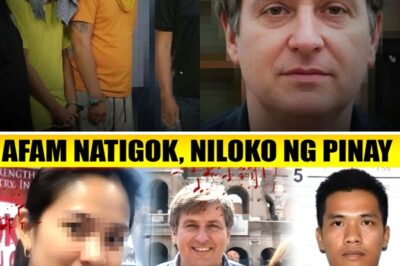
In a dramatic press conference that has sent shockwaves through the political landscape, Congressman Leandro Leviste has publicly challenged the integrity of Department of Public Works and Highways (DPWH) Secretary Vince Dizon, alleging that the man touted as a “reformer” may have active contractors within his own inner circle.
The explosive claims, which Leviste was careful to frame as “relaying” information rather than a direct accusation, paint a troubling picture of the very department Dizon was tasked to clean up.
“I am relaying what I have heard from multiple sources,” Leviste stated, “that Secretary Dizon or members of his team have connections with DPWH contractors. I was told by one source some in his team are contractors.”
This allegation strikes at the very heart of Dizon’s public image. Since taking the helm of the DPWH—an agency long beleaguered by accusations of deep-seated corruption—Dizon has been widely regarded as a force for positive change. Even Leviste himself acknowledged the “real improvements that have been done in DPWH since Secretary Dizon came into the picture.”
But this acknowledgment only served to sharpen the edge of his challenge. The congressman is now calling for “total transparency,” demanding that Dizon disclose all of his and his team members’ “connections, discussions, and interests in contractors and companies that do business with DPWH.”
The core of the allegation is not just that connections exist, but that a new system of favoritism is simply replacing the old one. Leviste speculated on a scenario that many Filipinos find all too familiar: the “replacing” of contractors favored under the previous leadership of Secretary Bonoan with “favored contractors of their own.” Shockingly, Leviste referred to this potential swap as “normal” in Philippine culture, suggesting a systemic rot that new appointments alone cannot fix.
Perhaps the most chilling metaphor used by Leviste was that of an “iceberg.” He claimed that the corruption visible in congressional budget insertions and public hearings is “only the tip of the iceberg.” The true, massive body of the problem, he alleged, “is in the office of the DPWH secretary.”
This implies that while Congress may add its own “contractor-sponsored projects,” the real power to orchestrate and hide these deals lies within the executive agency itself. It’s a direct challenge to Dizon’s control over his department and his commitment to transparency.
However, when pressed for hard evidence by the media, Leviste admitted his information was largely “verbal” and based on “multiple sources.” He offered no documents or named individuals, instead telling reporters they could “background check on Google the new appointees in the DPWH and find that there have been allegations of corruption to them in the past.”
This lack of concrete proof has opened Leviste to criticism, with many, including the press conference’s commentator, suggesting this is not a genuine crusade for reform but a sophisticated political “demolition job.”
According to the commentator’s analysis, the timing and target are highly suspicious. The DPWH, with its massive budget, is a powerful political tool. The prevailing theory among critics is that this attack on Dizon is a proxy war, with the true targets being political figures aligned with the previous administration of Rodrigo Duterte.
“Ang dahilan kung bakit binabanatan itong si Senator Christopher Pongo, simple lang. Number one senator ho siya,” the commentator explained, suggesting this is a calculated move to “implicate” and “destroy” Senator Bong Go. The motive? To neutralize a powerful political rival ahead of the 2025 midterm elections and as a potential successor should Vice President Sara Duterte be removed from office.
“Talagang tinatrabaho na ho nila itong si Senator Christopher Ponggo,” the commentator added, claiming that forces within the current administration are desperate to find any dirt to connect him to scandals, potentially using contractors like Discaya as leverage.
This narrative paints a picture of a multi-layered political game, where Dizon himself might just be a pawn, and Leviste, wittingly or unwittingly, a tool. The host even mocked Dizon, questioning if he was “threatened” by the Marcos administration into taking the “impossible” job at the DPWH, only to be forced to “change his tune” and target his boss’s political enemies.
The skepticism extends fully to Congressman Leviste. The commentator issued a scathing counter-challenge, accusing Leviste of hypocrisy. “Bakit hindi muna unahin diyan sa bakod niyo yung mga kongresista na kontratista?” (Why not start in your own backyard with the congressmen who are contractors?).
This pointed remark alludes to long-standing, widespread rumors that a significant number of House members are, in fact, contractors themselves, using their legislative power to insert their own projects into the national budget. The commentator challenged Leviste to “clean his own house,” starting from the top, before pointing fingers at an executive department.
The press conference itself was not without its own drama. At one point, Leviste was interrupted by a phone call, which he took. The commentator found the incident highly suspicious. Based on Leviste’s comments after the call, it was implied he was speaking with someone from the DPWH. Leviste relayed their supposed response: “kung meron man tatanggalin nila” (if there is anyone, they will remove them).
To critics, this was a moment of panicked damage control, or perhaps even a tacit admission that Leviste’s “verbal” sources were correct.
The entire controversy is set against the backdrop of the 2026 General Appropriations Bill. Leviste made a point to state that he voted against the budget precisely because his proposed reforms, such as lowering DPWH project prices by as much as 25%, were not adopted. He argues that such a price reduction would be definitive proof that Dizon is “not getting any kickbacks.”
In the end, the public is left to decipher a tangled web of accusations, political theories, and strategic deflections. Leviste has called on Secretary Dizon to be a “hero” and “come clean.” Dizon, the “reformer,” is now in the uncomfortable position of having to prove his own integrity.
Is this the courageous act of a young, idealistic congressman fighting to expose systemic corruption? Or is it, as the commentator scathingly concluded, “pulitika” (politics)—just another scripted drama where powerful factions fight for control, and the Filipino people are left to watch from the sidelines?
As the dust settles, one thing is certain: the pressure is now squarely on Secretary Vince Dizon to respond, and his answer could define not only his own legacy but the fate of the “reform” agenda he was appointed to champion.
News
Janitress na Itinakwil ng Pamilya ng Boyfriend Noon, Ginulat ang Lahat Nang Magpakilala Bilang CEO sa Kanilang Family Reunion!
Hindi habang buhay ay nasa ilalim tayo. May mga pagkakataon na ang mga taong inaapakan at minamaliit noon ay sila…
ANG MEKANIKONG NAKABISIKLETA: PAANO PINAHIYA NG ISANG DALAGA ANG 10 ESPESYALISTA AT PINALUHOD ANG ISANG BILYONARYO SA PAGPAPAKUMBABA
Sa ilalim ng nakapapasong init ng araw sa Uberlandia, Brazil, isang eksena ang umagaw sa atensyon ng marami—isang tagpo na…
DAYUHANG NAGHANAP NG PAG-IBIG SA CEBU, SINAPIT ANG MALAGIM NA WAKAS SA KAMAY NG ONLINE SYNDICATE
Sa mundo ng teknolohiya, tila napakadali na lamang maghanap ng koneksyon. Isang click, isang chat, at maaari ka nang makatagpo…
RETIRED SECRET AGENT, Naging Tricycle Driver Para sa Pamilya, Niligtas ang Bilyunaryang CEO Mula sa Kapahamakan at Binago ang Takbo ng Korapsyon sa Kumpanya!
Sa gitna ng mausok, maingay, at masikip na eskinita ng Tondo, may isang anino na tahimik na namumuhay. Si Elias…
Magsasaka, Ginipit ng Milyonarya: “Bigyan Mo Ako ng Anak o Ipapahabol Kita sa Aso” – Ang Kwento ng Pagbangon ni Noelito
Sa isang liblib na baryo sa San Isidro, kung saan ang hamog ng umaga ay humahalik pa sa mga dahon…
Batang Taga-Bundok, Hinamak sa Bangko Dahil sa Lumang Damit—Natahimik ang Lahat Nang Makita ang ₱100 Milyon sa Kanyang Account!
Sa mata ng marami, ang tagumpay ay nasusukat sa kintab ng sapatos, ganda ng damit, at garbo ng pamumuhay. Madalas,…
End of content
No more pages to load












